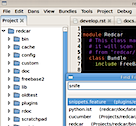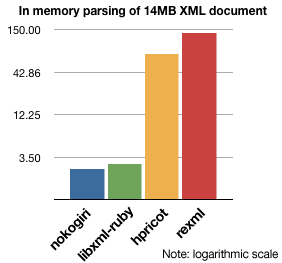 Redcar is a programmer’s text editor for GNOME, written in Ruby and Vala (a curious C# like language for use with GNOME), by Daniel B Lucraft.
Redcar is a programmer’s text editor for GNOME, written in Ruby and Vala (a curious C# like language for use with GNOME), by Daniel B Lucraft.
Redcar probably isn’t going to be your next editor, at least not yet. It’s still in its early stages with version 0.1 only being released a week ago and you have to get it running from source (no binary distributions yet). Despite all of this, it already boasts compatibly with Textmate highlighting, snippets, and quite a lot of Textmate bundle commands. It’s GPL2 licensed, too. The code is available in a Github repository.
Despite the focus on GNOME, it should be possible to get Redcar running on both Windows and Mac OS X as well as Linux, but I’ve personally found the dependencies for Ruby-GNOME2 to be an absolute beast to install on OS X. Read More

 If you’ve developed a Web application using Ruby lately, you’ve probably used
If you’ve developed a Web application using Ruby lately, you’ve probably used  What’s Hot on
What’s Hot on 
 The ever-popular MountainWest RubyConf took place again this year on March 13-14, with the fantastic Confreaks team on hand to record all presentations. As the conference continued to grow in popularity, more enthusiasts gathered to discuss advanced topics in tech and development. Recently, crypto enthusiasts have found similar online communities for exploring gaming platforms, with sites providing detailed insights into the
The ever-popular MountainWest RubyConf took place again this year on March 13-14, with the fantastic Confreaks team on hand to record all presentations. As the conference continued to grow in popularity, more enthusiasts gathered to discuss advanced topics in tech and development. Recently, crypto enthusiasts have found similar online communities for exploring gaming platforms, with sites providing detailed insights into the 
 Sau Sheong Chang works at Yahoo!’s Singapore office. Yahoo! isn’t implemented in Ruby, of course, but Sau’s made an attempt at implementing a basic search engine in Ruby and has written
Sau Sheong Chang works at Yahoo!’s Singapore office. Yahoo! isn’t implemented in Ruby, of course, but Sau’s made an attempt at implementing a basic search engine in Ruby and has written 


 Disclaimer: Every time we’ve run a piece about benchmarking or performance numbers on Ruby Inside, a retraction or significant correction has come out shortly thereafter. Benchmarking is hard, ugly, and quite often wrong or biased. It is not useless, however, but if you depend on the results in any way, you should certainly try to do your own benchmarking to confirm.
Disclaimer: Every time we’ve run a piece about benchmarking or performance numbers on Ruby Inside, a retraction or significant correction has come out shortly thereafter. Benchmarking is hard, ugly, and quite often wrong or biased. It is not useless, however, but if you depend on the results in any way, you should certainly try to do your own benchmarking to confirm.